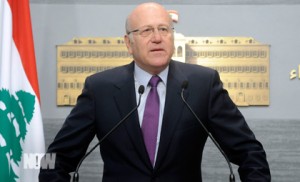 Caretaker Prime Minister Najib Mikati described the proposal pertaining to Lebanon’s oil resources put forward by the United States as logical but requires high-level discussions.
Caretaker Prime Minister Najib Mikati described the proposal pertaining to Lebanon’s oil resources put forward by the United States as logical but requires high-level discussions.
“The proposal put forward by the Americans is a logical proposal,” Mikati said in remarks published by As-Safir newspaper on Friday.
“The issue cannot be resolved singlehandedly but needs discussions to be conducted with President Michel Suleiman, Speaker Nabih Berri and caretaker Energy Minister Gebran Bassil.”
According to the newspaper, the US proposal was presented by US Deputy Assistant Secretary for Energy Diplomacy Amos Hochstein during his visit to Lebanon earlier in the month, and included a plan to establish a “maritime blue line.”
The daily added that the proposal presented a compromise for the disputed maritime area between Israel and Lebanon and aimed at reducing difference over the issue, in view of establishing a secure oil exploration operation.
As-Safir also quoted sources as saying that Hochstein proposed drawing a “non-finalized maritime blue line,” while refraining from conducting any exploration operations within the contested area.
The sources added that the new proposal was a “repeated attempt” to impose the “Hoff line” that was previously proposed by former US envoy Frederick Hoff to be drawn within the 860 Kilometer², which Lebanon considers as part of its exclusive economic zone.
Hoff’s proposal was put on hold after Lebanon refused to relinquish to Israel 360 square Kilometers of the initial 860 square Kilometer , according to the sources.
The daily also said that the Lebanese officials proposed to Hochstein the intervention of the United Nations in drawing the maritime line and in defining the area that would be excluded from the exploration operations, adding that the US envoy rejected the proposal.
In turn, Bassil said in remarks published by the Beirut daily that the US proposal needed decisive steps that go further than mere discussions.
“The issue requires more than discussions from the Lebanese side.”
“What is required is decisions and practical serious steps to move forward with the oil issue. What is required is a final decision to enable Lebanon to benefit from its oil and gas resources.”
The minister also said that the new proposals put forward by the US and relayed by Hochstein during his visit to Lebanon focused, not merely on the maritime borders, but also on the size of Lebanon’s resources.
In April, a group of 46 firms qualified to bid on a first round of licenses to explore Lebanese offshore gas fields, with 12 qualified to bid as operators.
Bassil has called on the cabinet—which resigned in March—and the parliament to hold extraordinary sessions to approve the oil sector decrees.
He had originally planned to conduct Lebanon’s first round of licensing for developing its offshore resources in May, but the cabinet’s resignation in March put the process on hold.
A government must still pass two decrees – laying out the model for the Production Sharing Agreement that companies will eventually sign and officially delineating the blocks available for bidding – before bidding and negotiations can begin.
Lebanon has been slow to exploit its maritime resources compared to other eastern Mediterranean countries. Israel, Cyprus and Turkey are all more advanced in their drilling efforts for oil and gas.
In March 2010, the U.S. Geological Survey estimated a mean of 1.7 billion barrels of recoverable oil and a mean of 34.5 trillion cubic meters of recoverable gas in the Levant Basin in the eastern Mediterranean, which includes the territorial waters of Lebanon, Israel, Syria and Cyprus.
The U.S. had offered to mediate between the sides in an attempt to reach a solution.
Beirut argues that a maritime map it submitted to the U.N. is in line with an armistice accord drawn up in 1949, an agreement which is not contested by Israel.
NOW

Leave a Reply
You must be logged in to post a comment.